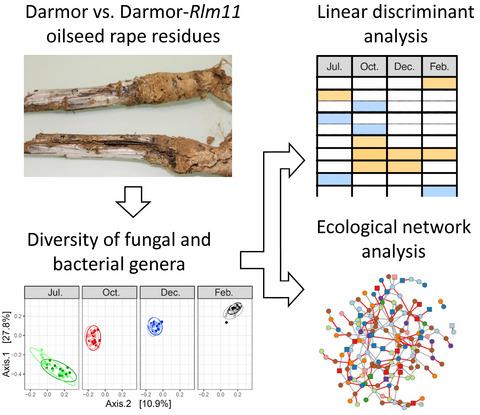当前位置:
X-MOL 学术
›
Mol. Plant Pathol.
›
论文详情
Our official English website, www.x-mol.net, welcomes your
feedback! (Note: you will need to create a separate account there.)
Impact of a resistance gene against a fungal pathogen on the plant host residue microbiome: The case of the Leptosphaeria maculans-Brassica napus pathosystem.
Molecular Plant Pathology ( IF 4.8 ) Pub Date : 2020-09-24 , DOI: 10.1111/mpp.12994 Lydie Kerdraon 1 , Matthieu Barret 2 , Marie-Hélène Balesdent 1 , Frédéric Suffert 1 , Valérie Laval 1
Molecular Plant Pathology ( IF 4.8 ) Pub Date : 2020-09-24 , DOI: 10.1111/mpp.12994 Lydie Kerdraon 1 , Matthieu Barret 2 , Marie-Hélène Balesdent 1 , Frédéric Suffert 1 , Valérie Laval 1
Affiliation

|
Oilseed rape residues are a crucial determinant of stem canker epidemiology as they support the sexual reproduction of the fungal pathogen Leptosphaeria maculans. The aim of this study was to characterize the impact of a resistance gene against L. maculans infection on residue microbial communities and to identify microorganisms interacting with this pathogen during residue degradation. We used near‐isogenic lines to obtain healthy and infected host plants. The microbiome associated with the two types of plant residues was characterized by metabarcoding. A combination of linear discriminant analysis and ecological network analysis was used to compare the microbial communities and to identify microorganisms interacting with L. maculans. Fungal community structure differed between the two lines at harvest, but not subsequently, suggesting that the presence/absence of the resistance gene influences the microbiome at the base of the stem whilst the plant is alive, but that this does not necessarily lead to differential colonization of the residues by fungi. Direct interactions with other members of the community involved many fungal and bacterial amplicon sequence variants (ASVs). L. maculans appeared to play a minor role in networks, whereas one ASV affiliated to Plenodomus biglobosus (synonym Leptosphaeria biglobosa) from the Leptosphaeria species complex may be considered a keystone taxon in the networks at harvest. This approach could be used to identify and promote microorganisms with beneficial effects against residue‐borne pathogens and, more broadly, to decipher the complex interactions between multispecies pathosystems and other microbial components in crop residues.
中文翻译:

抗真菌病原体的抗性基因对植物宿主残基微生物组的影响:以Leptosphaeria maculans-Brassica napus病理系统为例。
油菜油菜残渣是茎溃疡病流行病学的关键决定因素,因为它们支持真菌病原体Leptosphaeria maculans的有性繁殖。这项研究的目的是表征抗黄斑狼疮感染的抗性基因对残留微生物群落的影响,并鉴定在残留降解期间与该病原体相互作用的微生物。我们使用近等基因系获得健康和感染的寄主植物。与两种类型的植物残基相关的微生物组通过元条形码进行了表征。线性判别分析和生态网络分析相结合,用于比较微生物群落并鉴定与黄斑狼疮菌相互作用的微生物。两系之间的真菌群落结构在收获时有所不同,但随后没有差异,这表明抗性基因的存在/不存在会影响植物存活时茎基部的微生物组,但这不一定会导致差异定植。残留的真菌。与社区其他成员的直接互动涉及许多真菌和细菌扩增子序列变异体(ASV)。L. maculans似乎发挥网络的作用不大,而一个ASV隶属于Plenodomus biglobosus(同义词颖biglobosa)从颖物种复合体可以被视为收获时网络中的关键分类单元。该方法可用于鉴定和促进对残留病原体具有有益作用的微生物,并且更广泛地讲,可用于破译多物种病原体与作物残留物中其他微生物成分之间的复杂相互作用。
更新日期:2020-11-27
中文翻译:

抗真菌病原体的抗性基因对植物宿主残基微生物组的影响:以Leptosphaeria maculans-Brassica napus病理系统为例。
油菜油菜残渣是茎溃疡病流行病学的关键决定因素,因为它们支持真菌病原体Leptosphaeria maculans的有性繁殖。这项研究的目的是表征抗黄斑狼疮感染的抗性基因对残留微生物群落的影响,并鉴定在残留降解期间与该病原体相互作用的微生物。我们使用近等基因系获得健康和感染的寄主植物。与两种类型的植物残基相关的微生物组通过元条形码进行了表征。线性判别分析和生态网络分析相结合,用于比较微生物群落并鉴定与黄斑狼疮菌相互作用的微生物。两系之间的真菌群落结构在收获时有所不同,但随后没有差异,这表明抗性基因的存在/不存在会影响植物存活时茎基部的微生物组,但这不一定会导致差异定植。残留的真菌。与社区其他成员的直接互动涉及许多真菌和细菌扩增子序列变异体(ASV)。L. maculans似乎发挥网络的作用不大,而一个ASV隶属于Plenodomus biglobosus(同义词颖biglobosa)从颖物种复合体可以被视为收获时网络中的关键分类单元。该方法可用于鉴定和促进对残留病原体具有有益作用的微生物,并且更广泛地讲,可用于破译多物种病原体与作物残留物中其他微生物成分之间的复杂相互作用。











































 京公网安备 11010802027423号
京公网安备 11010802027423号